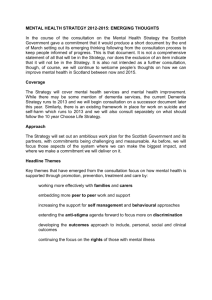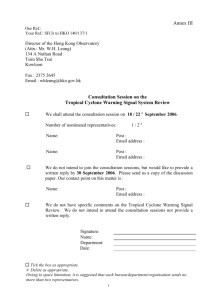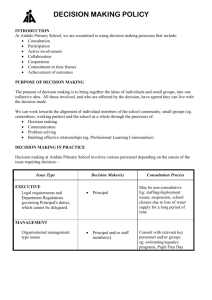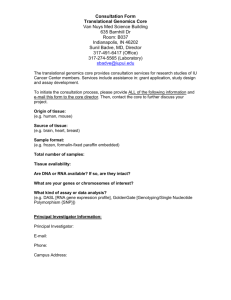Mental Health Commission of Western Australia
advertisement
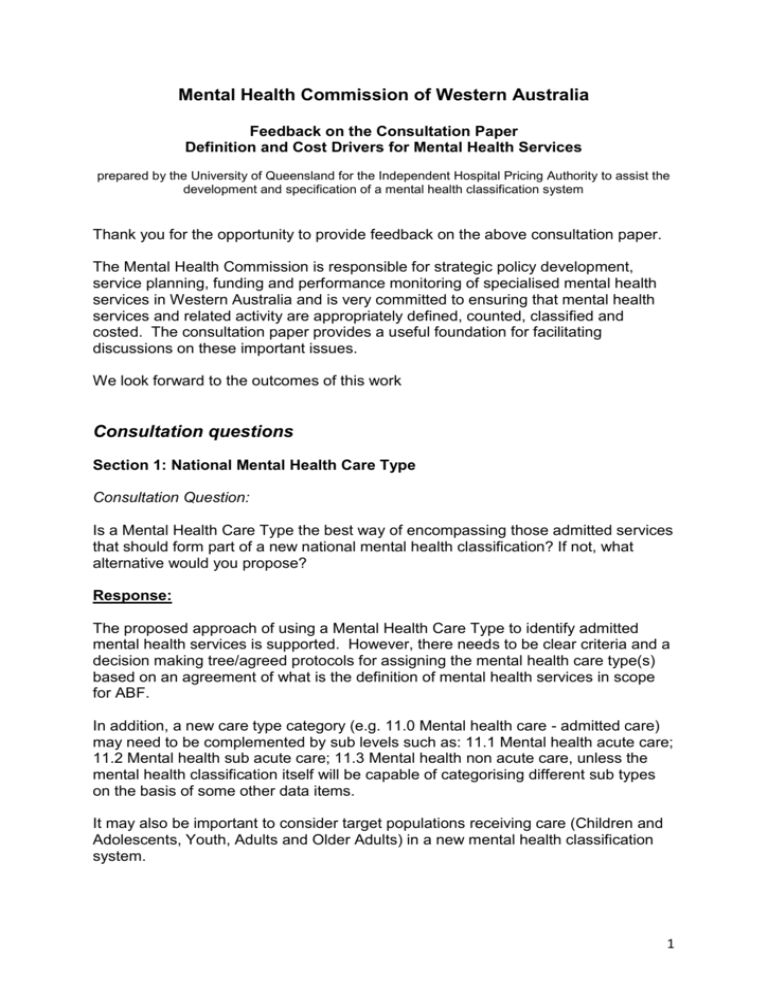
Mental Health Commission of Western Australia Feedback on the Consultation Paper Definition and Cost Drivers for Mental Health Services prepared by the University of Queensland for the Independent Hospital Pricing Authority to assist the development and specification of a mental health classification system Thank you for the opportunity to provide feedback on the above consultation paper. The Mental Health Commission is responsible for strategic policy development, service planning, funding and performance monitoring of specialised mental health services in Western Australia and is very committed to ensuring that mental health services and related activity are appropriately defined, counted, classified and costed. The consultation paper provides a useful foundation for facilitating discussions on these important issues. We look forward to the outcomes of this work Consultation questions Section 1: National Mental Health Care Type Consultation Question: Is a Mental Health Care Type the best way of encompassing those admitted services that should form part of a new national mental health classification? If not, what alternative would you propose? Response: The proposed approach of using a Mental Health Care Type to identify admitted mental health services is supported. However, there needs to be clear criteria and a decision making tree/agreed protocols for assigning the mental health care type(s) based on an agreement of what is the definition of mental health services in scope for ABF. In addition, a new care type category (e.g. 11.0 Mental health care - admitted care) may need to be complemented by sub levels such as: 11.1 Mental health acute care; 11.2 Mental health sub acute care; 11.3 Mental health non acute care, unless the mental health classification itself will be capable of categorising different sub types on the basis of some other data items. It may also be important to consider target populations receiving care (Children and Adolescents, Youth, Adults and Older Adults) in a new mental health classification system. 1 Section 2: Establishing criteria for the definition of services within a national mental health Care Type Consultation Question: What should be the criterion, or criteria, for the definition of services within a national mental health Care Type? Response: As indicated in the Consultation paper, it would seem reasonable to define the mental health care type to include treatment provided in specialised mental health units or by a specialised mental health program. Section 3: Applying the definition of ‘mental health services’ to communitybased mental health services Consultation Question: What community-based mental health services should be defined as mental health services for casemix classification purposes? Response: All ambulatory services provided by a specialised mental health program including outpatient services and outreach. Special consideration should also be given to mental health consultation liaison services. Section 4: Defining primary mental health services delivered by public hospitals Consultation Question: Are there any services that are provided by specialised mental health units or programs that can be considered primary mental health? Response: Generally, primary mental health services are provided outside specialised mental health units or programs. However, there is a small component of services provided by specialised mental health services that would be considered to be primary care e.g. services in some rural and remote areas where a GP service is not available. This is a real concern in Western Australia. Section 5: Services for people whose primary problem is an alcohol or drugrelated disorder Consultation Questions: 2 Should the mental health classification include alcohol and drug-related disorders? If so, is it the diagnosis or specialised treatment setting that is used as the decisive criterion for inclusion in the definition? Response: It is recommended that the mental health classification include alcohol and drugrelated disorders, however specialised treatment setting is used as the decisive criterion for inclusion in the definition. Section 6: Classifying specialised ‘non-acute’ bed-based mental health services Consultation Question: Should long-term non-acute bed-based clinically-staffed mental health public hospital services be classed as residential, admitted mental health or admitted maintenance care? Response: Long-term non-acute bed-based clinically-staffed mental health public hospital services should be classed as admitted mental health. In Western Australia mental health residential services are predominately provided by NGOs with in reach clinical services provided by mental health community teams. Section 7: Setting the boundary with aged inpatient Care Types Consultation Question: Should the Psychogeriatric Care Type continue to exist or should all of the mental health care of older people be defined as Mental Health for classification purposes? Response: All Older Adult mental health inpatient care should be classified as Acute, Sub Acute or Non Acute. These definitions need some clarification, but the main principles would be that: Acute mental health care for the elderly relates to assessment and treatment of acute and/or unstable mental health conditions. Sub-acute mental health care for the elderly relates to ongoing assessment and treatment of a patient whose acute mental health issues have been addressed and treated, but that full recovery has not been completed and/or significant psychosocial issues are present that require resolution before the patient can return to accommodation in the community 3 Non-acute care relates to ongoing assessment and treatment of a patient whose mental health issues have been addressed and are stable, but that complex care needs preclude placement in available community accommodation This approach would mean that the term “psychogeriatric care” will become redundant as it is often inconsistently understood and applied. Section 8: Emergency department care for patients with a mental disorder Consultation Question: Should mental health care in the emergency department (ED) be defined as ED or Mental Health for classification purposes? If mental health encompasses emergency department care services, how should these services be classified (e.g., diagnosis based on MDCs?) Response: There should be a diagnostic code/flag for mental health patients in ED. The new classification for mental health could include a sub-classification for ED. URG classification is of limited value for mental health. Consideration should be given to the role of mental health consultation liaison services in EDs. 4


